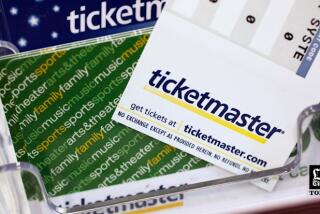Home Shopping Network to Buy Ticketing Firm
- Share via
SAN DIEGO — Fueling speculation that it may soon offer a new line of entertainment and recreation products to its viewers, Home Shopping Network said Friday that it plans to buy Mistix Corp., operator of the computerized ticketing and reservation systems whose clients include the San Diego Padres, California state parks and the Hearst Castle.
The price for the sale of San Diego-based Mistix, which operates both the Mistix and Teleseat ticket systems, was not disclosed. Home Shopping Network Chairman Roy Speer confirmed the purchase Friday in a talk before securities analysts in New York, a spokeswoman said. Officials at Mistix and its parent, Gtech, declined to discuss the sale, saying an announcement would be made next week.
San Diego Padres Senior Vice President Elten Schiller, who was informed 10 days ago by Mistix officials that the company was being sold, said Home Shopping may try to use Mistix to assemble a national television system to sell sports tickets. The Padres will continue to use Teleseat as its ticket service after the sale, he said.
Executives at Home Shopping Network’s Clearwater, Fla., headquarters were not available to discuss their plans for Mistix, but one analyst speculated that the acquisition may position it to become the “Ticketron of TV,” adding that the move apparently is part of Home Shopping’s effort to broaden the line of products and services offered to HSN viewers.
Merchandise Ordered by Phone
“I don’t know how they are going to integrate (Mistix), but this is one of the better ideas I’ve heard from them, as opposed to trying to branch out in pharmaceuticals and financial services,” said Mark B. Friedman, an analyst with Homans, McGraw, Trull & Valeo in Boston. He said HSN may try to sell tickets nationwide for entertainment as well as sports events.
HSN is a nationwide, 24-hour TV marketing network that claims a membership of 2.5 million viewers and outlets that can reach a potential audience of 38 million. The network, which includes four company-owned stations, including KHSC in Los Angeles, and additional cable-TV outlets, markets a broad array of merchandise. Buyers typically order products over the phone, paying with bank credit cards or checks.
In a bid to boost what analysts described as weakening sales trends, HSN has announced plans over the past year to expand its TV offerings to include financial services and prescription drugs, although those introductions have been delayed. As part of the expansion strategy, HSN last year bought a regional stock brokerage in Dallas.
“Of all the things HSN has done of late, at least (the Mistix deal) sounds plausible,” said Tim Rice, of Johnson & Rice, a New Orleans investment firm. The company has been under fire for paying too much for its four television stations.
Gloom Seen Continuing
“There is no reason to dismiss this out of hand, which is not typical of the other businesses they have gone into.”
HSN reported a profit of $5.2 million on sales of $192.8 million for the second quarter ended Feb. 29, compared to a profit of $9.3 million on sales of $165.3 million for the same quarter last year.
Friedman sees the gloom continuing for HSN, projecting a 15-cent per share profit in fiscal 1988, down from 33 cents last year. “The early buyers have burned out. Revenues have peaked and will be leveling off for the rest of the year,” Friedman said.
After rocketing to a high of $131 from an initial public offering price of $18 per share in August, 1986, HSN stock has fallen back to earth. HSN shares closed Friday at $6.125 a share, off $1.375, in heavy trading on the American Stock Exchange, compared to a split-adjusted initial offering price of $3 per share.
The Teleseat software, which forms the basis of Mistix’s ticketing technology, was developed by the Padres baseball club in 1983 for its in-house ticket sales system. The Padres sold the system to Gtech in 1986, the same year that Gtech acquired Mistix. Gtech, based in Providence, R.I., gets 95% of its revenue from operating state lottery networks, including the California Lottery.
Mistix, which has more than 150 employees, sells tickets through outlets such as Bill Gamble clothing stores and by telephone. One source close to Mistix who asked not to be identified said the company lost over $1 million last year.
In late 1985, Mistix won the $15-million, five-year contract to provide ticketing for the California state campgrounds and for Hearst Castle tours. The winning bid, which was selected over a lower bid from Ticketron, stirred controversy after a state investigation turned up false financial statements submitted by Mistix and shoddy review practices by state officials.
The state was forced to put the contract back out for another bid, but Mistix was again awarded the contract in August, 1987.
More to Read
The biggest entertainment stories
Get our big stories about Hollywood, film, television, music, arts, culture and more right in your inbox as soon as they publish.
You may occasionally receive promotional content from the Los Angeles Times.










